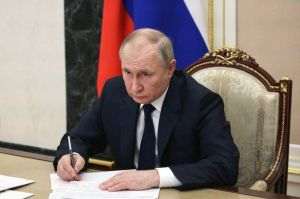Roxana Mînzatu, the Ciolacu government's proposal for the position of European Commissioner from Romania, was nominated yesterday by Ursula von der Leyen, the president of the European Commission, as one of the six vice-presidents of the Community Executive, whose members are to be voted in the following period the specialized committees of the European Parliament and the plenary vote of this EU forum. It is the first time since our country's accession to the European Union in 2007 that a representative of Romania holds the position of vice-president of the European Commission.
Immediately after the nomination of Roxana Mînzatu as vice-president of the European Commission, Prime Minister Marcel Ciolacu declared: "For the first time since joining the European Union, Romania obtained the position of vice-president of the European Commission and one of the most important portfolios - Competences and Education, Places of labor and social rights, demography. A major portfolio, which will manage a fifth of the EU budget, 235 billion euros to be exact. Practically, Romania becomes part of the decision in the European Union. Mrs. Roxana Mînzatu, Romania's proposal for European Commissioner, will coordinate both the education part and the area of social policies, but also the financing programs related to these areas, namely the European Social Fund Plus, the Social Fund for Climate and Erasmus+. Today, the Romanians' efforts have also received well-deserved recognition through this portfolio that combines significant political weight and substantial EU funds, with solid legislative and political potential and essential access to the Commission's services and agencies. (...) All those who denigrated our country and our ability to negotiate in Brussels received an extremely hard lesson today: it is never good to speak ill of your country abroad, but to fight and contribute to its development".
The former European Commissioner for Agriculture and former Prime Minister of Romania, Dacian Cioloş, said: "I have to admit that the Government of Romania negotiated well the interest of Romania at the top of the European Commission, through the portfolio and the position of Executive Vice President that Roxana Mînzatu obtained. We have said several times in recent months that we must also aim for a vice-president position in the Commission, beyond an important portfolio, because our country's influence in the EU demands it. The Government has now achieved this and all those who negotiated are to be congratulated. Also, the portfolio that will be handled by the commissioner from our country, even if it is not covered by many provisions of the European treaties, has an important political and financial weight. The European social model that has been talked about so much in recent years, jobs and the direction in which we need to develop skills for the digital future, for example, on the decarbonized economy, will be at the forefront of the European debate in the coming years. It is a portfolio on which a lot can be built because expectations are high in these areas both at the level of citizens and in an important part of the political spectrum. Beyond the congratulations to Roxana Mînzatu, I believe that it is necessary for her to receive all the necessary support to play the European and Romanian interest in this mandate so that from now on Romania can be seen as a country that defines the future of the Union, not only one that takes over what is decided".
• The structure of the future European Commission
During the press conference she held in Brussels and in which she presented the future composition of the European Commission, Ursula von der Leyen said: "The College of European Commissioners is dedicated to competitiveness, according to the main recommendation in the Draghi report. We will help strengthen technological sovereignty, security and democracy. We will build a competitive, decarbonised and circular economy with a fair transition for all. We will design a bold industrial strategy focused on innovation and investment. We will strengthen European and regional cohesion and support our people, skills and social model. All these things are reflected in the duties of the six executive vice presidents. (...) As you can see, we have eleven women in the College of Commissioners that I am proposing today, which means 40% of all Commissioners. When we received the first round of applications and candidates, we were heading towards a Commission of approximately 22% women and 78% men. It was unacceptable. So we worked with the Member States and managed to improve the balance to 40% women and 60% men".
According to the head of the Community Executive, the six executive vice-presidents are:
- Teresa Ribera - Vice President for Green, Fair and Competitive Transition, European Commissioner for Competition.
- Henna Virkkunen - Executive Vice President for Technological Sovereignty, Security and Democracy, European Commissioner for digital and advanced technologies.
- Stephane Sejourne - Executive Vice-President for Prosperity and Industrial Strategy, European Commissioner for Industry, SMEs and the Single Market.
- Kaja Kallas - Executive Vice President and will be High Representative for Foreign Policy and Security.
- Roxana Mînzatu - Executive Vice-President for People, Skills and Training, European Commissioner for Professional Skills, Education and Culture, Jobs, Social Rights and Demography. As executive vice-president of the European Commission, Roxana Mînzatu will lead the work on the Union of Competences and the European Pillar of Social Rights.
- Raffaele Fitto - Executive Vice-President responsible for Cohesion and Reforms, European Commissioner for Cohesion Policy, Regional Development and Local Communities.
The other European Commissioners are:
- Maro¹ ©efèoviè - responsible for trade and economic security, responsible for inter-institutional relations and transparency.
- Valdis Dombrovskis - responsible for economy and productivity, implementation and simplification.
- Dubravka ©uica - responsible for the Mediterranean area.
- Oliver Varhely - responsible for health
- Wopke Hoekstra - responsible for climate, decarbonisation and green transition.
- Andrius Kubilius - responsible for defense and space.
- Marta Kos - responsible for EU enlargement and the Eastern Neighbourhood.
- Jozef Síkela - responsible for international partnerships, president of Global Gateway.
- Costas Kadis - responsible for maritime and fishing activity.
- Maria Luís Albuquerque - responsible for Financial Services and the Savings and Investments Union.
- Hadja Lahbib - responsible for preparation and crisis management.
- Magnus Brunner - responsible for Home Affairs and Migration.
- Jessika Roswall - responsible for the environment and competitive circular economy.
- Piotr Serafin - responsible for the budget, the fight against fraud and public administration.
- Dan Jørgensen - responsible for energy and housing.
- Ekaterina Zaharieva - responsible for research and innovation.
- Michael McGrath - responsible for democracy, justice and the rule of law.
- Apostolos Tzitzikostas - responsible for sustainable transport and tourism.
- Christophe Hansen - responsible for agriculture and food.
- Glenn Micallef - responsible for intergenerational equity, culture, youth and sport.
In the next period, all of the above will go through the validation procedure within the committees of the European Parliament, after which the entire European Commission will be subject to the vote of the plenary of the European deputies. Ursula von der Leyen wants the new European Commission to start work no later than November 1, 2024.
























































